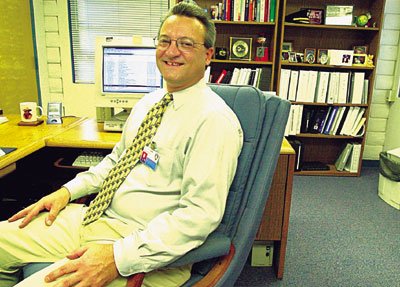Gilroy
– City officials scuttled Gilroy police officers’ request to
re-hire retired cops during a dire staffing shortage, then quietly
offered the same option to the department’s top brass, months
later.
Gilroy – City officials scuttled Gilroy police officers’ request to re-hire retired cops during a dire staffing shortage, then quietly offered the same option to the department’s top brass, months later.
In July, police supervisors suggested re-hiring retirees to pinch-hit for the short-staffed department, according to meeting minutes obtained by the Dispatch. Eleven out of 59 officers took off to care for newborn babies, and police were feeling the pinch. But police administrators and other city officials deemed the plan “impractical,” since retirees would need to be screened and retrained before signing on.
Months later, Police Chief Gregg Giusiana and Assistant Chief Lanny Brown retired, then returned as hourly employees, nearly doubling their pay. City administrator Jay Baksa orchestrated the plan, and said it saves the city roughly $116,000 in benefits and pension contributions. State officials say it’s legal. But until the Dispatch began asking questions, no one told city council, or the rank-and-file police – and they’re not the only ones steamed.
“This is disgraceful,” said Gordon Sonne, retired Monterey County Sheriff, who caught wind of the story while visiting family in Gilroy. “Their own officers didn’t even know they’d retired … It’s a morale-buster, and a terrible message to send to the troops.”
Now, some officers are angered by what they perceive as a double standard for “double-dipping,” said Cpl. Jim Callahan, president of the Gilroy Police Officers Association.
“They’ve given an explanation,” said Callahan, “but whether it’s valid, I don’t know.”
Giusiana and human resources director LeeAnn McPhillips defended the decisions in a joint e-mail.
“There were several obstacles to overcome before we could re-hire officers who had been separated from service,” Giusiana and McPhillips wrote. “There is a need to be consistent with our hiring practices and ensure that we complied with [the California Commission on Peace Officer Standards and Training]’s hiring policies.”
Rehired officers would have to undergo new training, updated background checks, and medical and psychological evaluations before rejoining the department, Giusiana and McPhillips explained. Those who’d worked special assignments would need retraining before working patrol, they added.
“Given some of these issues, and the time and cost associated with them, we decided not to pursue the option at that time,” wrote Giusiana and McPhillips. By the time city officials had reviewed the option, they added, the department was “about midway through” its baby boom. “We would not get much return on the investment once we completed the rehire process and got someone out on patrol.” Instead, they said, they opted to focus on filling one vacancy, and hired a new officer in December.
“If a person isn’t a sworn officer for more than a day, we basically have to rehire them,” said Capt. Kurt Svardal, the department’s public information officer. “It’s like we start from scratch.”
Callahan disputed McPhillips and Giusiana’s description of the training time required, saying it would probably take a week. McPhillips and Giusiana cited a “minimum of two weeks of training,” which “after a separation from service … would have in all likelihood been much greater.” In addition, one of the retirees under discussion, Gil Gallo, is a reserve officer, and hasn’t had any separation in service.
The argument that specialized officers couldn’t fill in for patrol has also met resistance, since the department was temporarily short one detective, who was in and out of the office on medical leave last year. Four detectives scrambled to cover the work of five, in a rough year for property crime: Grand theft auto skyrocketed 70 percent in Gilroy, and burglaries bumped up 11 percent.
Ironically, the officers’ rejected proposal more closely follows the spirit of state law, which permits retirees to return temporarily to fill vacancies, than the retire-and-return plan engineered by Baksa and the chiefs.
Retired annuitants are “primarily used to fill in on a temporary basis, either where you have shortages or absences,” explained Karon Green, chief consultant for the state assembly’s Public Employees Retirement and Social Security committee. In a previous interview, Green said that Gilroy’s pre-planned scheme is legal, but violates “the intent of the law.”
Legal or not, said Sonne, keeping it secret “sends the wrong signal, and it’s underhanded.
“Sure, it’s legal, and they can do it,” he added, “but to not tell your own officers?”













